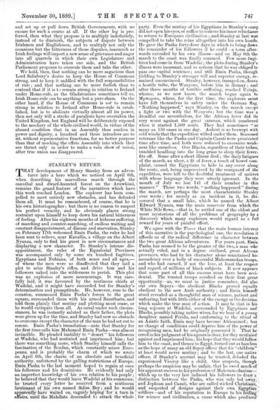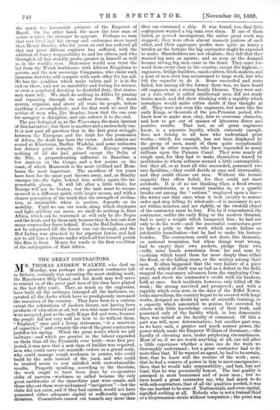STANLEY'S RETURN. T HAT development of Henry Stanley from an adven-
turer into a hero which we noticed on April 6th, when describing his marvellous march through the cannibal and dwarf-haunted forest on the Aruwhimi, remains the grand feature of the narratives which have this week reached London. The explorer has been com- pelled to meet entirely new obstacles, and has defeated them all. It must be remembered, of course, that he is his own historiographer ; but there is no reason to suspect his perfect veracity, and he obviously places strong restraint upon himself to keep down his natural bitterness of feeling. After his eighteen months of hideous suffering, of marching and counter-marching, of endless waiting and constant disappointment, of disease and starvation, Stanley on February 17th welcomed Emin Pasha, the ruler he had been sent to relieve, near Kavallis, a village on the Albert Nyanza, only to find his guest in new circumstances and displaying a new character. To Stanley's intense dis- appointment, the ruler of the Equatorial Provinces was accompanied only by some six hundred fugitives, Egyptians and Nubians, of both sexes and all ages,— of whom the men were so disaffected that they laid a plot to seize Stanley's rifles, and drive him and his followers naked into the wilderness to perish. This plot was no explosion of mere murmurings. It was care- fully laid, it was favoured by the mutinous chiefs at Wadelai, and it might have succeeded but for Stanley's determination and promptitude. He, however, rose to the occasion, summoned Emin Pasha's forces to the great square, surrounded them with his armed Zanzibaris, and told them plainly that mutiny and plotting must cease, or he would extirpate them all. As usual under such circum- stances, he was instantly saluted as their father, the plots were given up for the time, and Stanley had now no obstacle to overcome except the character of the man he had set out to rescue. Emin Pasha's irresolution—note that Stanley for the first time calls him Mahomed Emin Pasha—was almost invincible. He pleaded inability to " desert " his followers at Wadelai, who 'had mutinied and imprisoned him ; but there was something more, which Stanley himself calls the fascination of the Soudan, which constantly seizes Euro- peans, and is probably the charm of which we wrote on April 6th, the charm of an absolute and beneficial authority, unfettered by the galling restrictions of Europe. Emin Pasha to the last moment hoped to regain at once his followers and his dominions. He evidently had only an imperfect knowledge of his own relation to his people ; he believed that they would leave Wadelai at his summons; he trusted every letter he received from a mutinous lieutenant of his own named Selim Bey ; and he. would apparently have waited on vaguely hoping for a turn in affairs, until the Mahdists descended to attack the whole party. Even the mutiny of his Egyptians in Stanley's camp did not open his eyes, or suffice to remove his inner reluctance to return to European civilisation ; and Stanley at last was compelled to take the reins altogether into his own hands. He gave the Pasha forty-four days in which to bring down the remainder of his followers if he could—a term after- wards extended by his own illness—and on May 8th the march to the coast was finally resumed. Few more fugi- tives had come in from Wadelai; the plots during Stanley's illness were incessant, and so serious that he was obliged to pass one capital sentence ; and still Emin Pasha, though yielding to Stanley's stronger will and superior energy, re- mained unconvinced. Stanley, however, tramped on, drove a hostile tribe, the Wanyoro, before him in dismay ; and after three months of terrible suffering, reached Uzinja, whence, as we now know, the march began again to Mpwapwa, where, for the first time, the explorers must have felt themselves in safety under the German flag_ "Nothing happened," says Stanley, on the march except. a fight or two with the Wanyoro ; but the time was a dreadful one nevertheless, for the African fever did its very worst against the great caravan, which numbered when it started 1,500 souls. They had sometimes "as many as 150 cases in One day. Aukori is so beswept with cold winds that the expedition wilted under them. Seasoned veterans like the Pasha and Captain Casati were prostrated time after time, and both were reduced to excessive weak- ness like ourselves. Our Blacks, regardless of their tribes; tumbled headlong into the long grass to sleep their fever- fits off. Some after a short illness died ; the daily fatigues of the march, an ulcer, a fit of fever, a touch of bowel com- plaint, caused the Egyptians to hide in any cover along the route, and, being unperceived by the rearguard of the expedition, were left to the doubtful treatment of natives with whose language they were utterly ignorant. In the month of July- we lost 141 of their number in this manner." Those two words, "nothing happened" during the march, are perhaps the most characteristic Stanley ever wrote ; for merely as an incident in it, he dis- covered that a small lake, which he named the Albert Edward Nyanza, was the main reservoir from which The White Nile flows,—that is, he settled one of the oldest and most mysterious of all the problems of geography by a discovery which many explorers would regard as a full reward for years of painful effort.
We agree with the Times that the main human interest of this narrative is the psychological one, the revelation it affords us of the radical difference in character between the two great African adventurers. For years past, Emin Pasha has seemed to be the greater of the two, a man who actually ruled, and in a degree civilised, great African provinces, who had by his character alone maintained his ascendency over a body of successful Mahommedan troops, and who had earned, if not the love, at least the respect and regard, of millions of black subjects. It now appears that some part of all this success must have been acci- dental. The trusted troops revolted on their first great opportunity—as, we must in justice remember, did also our own Sepoys —the obedient Blacks proved equally obedient to the new Arab authority ; and Emin himself stood revealed as a thoughtful man of science, patient and unfearing, but with little either of the energy or the decision which make the true man of action. It may be that in his long sojourn at Wadelai, surrounded by Egyptians and Blacks, possibly taking native wives, for we hear of a young daughter named Ferida, and conforming to the ritual of an Asiatic faith, Emin may have become Africanised ; but no change of conditions could deprive him of the power of recognising men, had he originally possessed it. That he erred in his judgment of his agents is clear, for they mutinied against and imprisoned him; his hope that they would follow. him to the coast, and thence to Egypt, turned out as baseless as the hope of many an old Sepoy officer that his "Children" at least would never mutiny; and to the last, one native officer, if Stanley's account may be trusted, deluded the experienced Viceroy like a child. One suspects, though perhaps the suspicion may be unfair, that he owed much of his apparent success to his profession of Mahommedanism- which up to the very last induced his followers to draw a ' distinction between the Pasha, who was only led away; and Jephson and Casati, who are called wicked. Christians, and suspected. of designs against their own Egyptian.' soldiers—and of his reputation in Europe to his-re-One for science and civilisation, a cause which also produced" the much too favourable estimate of the Emperor of Brazil. On the other hand, the more the true man of action is tried, the stronger he appears. Perhaps no man that ever lived had his energy and endurance more taxed than Henry Stanley, who for years on end has suffered all that any great African explorer has suffered, with the addition of heavy responsibility to and for others, and who through it all has steadily grown greater in himself as well as in the world's eyes. Statesmen would now trust the lad from the Welsh workhouse with African Kingdoms to govern, and the new sovereign Companies, who claim such immense districts, will compete with each other for his aid. He has the qualities which make rulers, and it is in the end on these, and not on amiability and feeling for science, or even a perplexed devotion to doubtful duty, that states- men must rely. We shall do nothing in Africa by passing and repassing through its endless forests. We must govern, organise, and above all train its people, before anything is accomplished ; and for that work we need the service of men who, like Stanley, know that the one cure for savagery is discipline, and can enforce it to the end. The psychological is, as the Times says, the main interest of this narrative ; but there is another and a melancholy one. It is now past all question that in the first great struggle between the European and the Arab for the possession of Africa, the Arab has been the victor. Arab armies are seated at Khartoum, Darfur, Wadelai, and some unknown but distant point towards the West. Europe retains nothing of all she had gained except the Delta of the Nile, a preponderating influence in Zanzibar, a few stations on the Congo, and a few points on the coast, of which Massowah is the most civilised and Mom- bassa the most important. The sacrifices of ten years have been for the most part thrown away, and, as Stanley emerges into the light, behind him settles again the im- penetrable gloom. It will lift after a little while, for Europe will not be beaten ; but the task must be recom- menced in a different spirit, with larger means, and with a clearer perception of the truth that the strength of civilisa- tion, so irresistible when in motion, depends on its mobility. Until we can cut roads along which elephants and light artillery can move, we shall do nothing in East Africa, which can be traversed at will only by the Negro and the Arab, and by them only because they do not care how many corpses they leave behind. Even the Red Indian could not be conquered till the forest was cut through, and the Red Indian was attacked by far superior forces, and had not to aid him a climate under which all but himself perish like flies in frost. Money for roads is the first condition of the subjugation of East Africa.







































 Previous page
Previous page